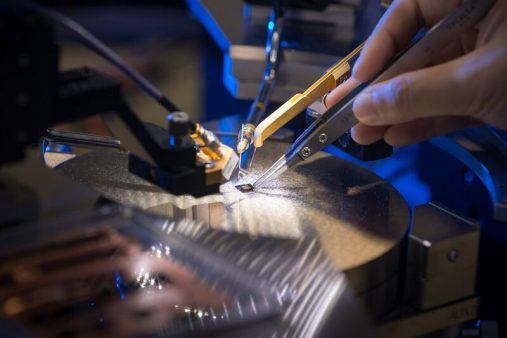World’s first Compound Semiconductor Cluster in South Wales
20 February 2018
As part of the College of Physical Sciences and Engineering’s Lecture Series in January, we enjoyed an outstanding lecture from Professor David Wallis on his work on gallium nitride (GaN) – a new type of Compound Semiconductor enabling a revolution in the performance of electronic devices.
GaN is the material at the core of the LED lighting revolution and has already transformed the way electricity is used to generate light: GAN LEDs are 10 times more efficient than incandescent light bulbs. Professor Wallis is also undertaking research to develop GaN based transistors, which are again significantly more efficient than their silicon-based counterparts. These transistors will transform the way we transmit information in mobile phone networks and convert electricity form AC to DC and different voltages in power networks. Altogether GaN based devices have the potential to reduce total global electricity consumption by up to 25%, the equivalent to closing around 2500 coal-fired power stations. It is therefore clear that this is a technology that will have, and is already having, significant impact on a global scale.
In recognition of the importance of this area of technology, Cardiff University, together with the Welsh and UK governments and local industry, is currently investing close to £500m in the development of the world’s first Compound Semiconductor Cluster in South Wales.
This is done under the banner of ‘CS Connected’ and includes institutions such as our Institute for Compound Semiconductors and the EPSRC Compound Semiconductor Hub, the Compound Semiconductor Centre, the Compound Semiconductor Applications Catapult and business partners IQE, SPTS and Microsemi.
CS Connected has already reached end users such as Airbus, General Dynamics and GE Healthcare. The CS Connected partners will deliver world-leading research in Compound Semiconductors which have transformational applications in big data, cyber-security, communications, the Internet of Things, artificial intelligence, automotive vehicles, 3D imaging, aerospace, energy efficiency, power control, safety, security, space applications and satellite systems – delivering huge societal benefit.
- June 2024
- May 2024
- April 2024
- February 2024
- January 2024
- December 2023
- November 2023
- October 2023
- September 2023
- August 2023
- July 2023
- June 2023
- May 2023
- April 2023
- March 2023
- February 2023
- January 2023
- December 2022
- November 2022
- October 2022
- September 2022
- August 2022
- July 2022
- June 2022
- May 2022
- April 2022
- March 2022
- February 2022
- January 2022
- December 2021
- November 2021
- October 2021
- September 2021
- August 2021
- July 2021
- June 2021
- May 2021
- April 2021
- March 2021
- February 2021
- January 2021
- December 2020
- November 2020
- October 2020
- September 2020
- August 2020
- July 2020
- June 2020
- May 2020
- April 2020
- March 2020
- February 2020
- January 2020
- December 2019
- November 2019
- October 2019
- September 2019
- August 2019
- July 2019
- May 2019
- April 2019
- March 2019
- February 2019
- January 2019
- December 2018
- November 2018
- September 2018
- July 2018
- June 2018
- May 2018
- April 2018
- March 2018
- February 2018
- January 2018
- December 2017
- November 2017
- October 2017
- September 2017
- August 2017
- July 2017
- June 2017
- May 2017
- April 2017
- March 2017
- February 2017
- January 2017
- December 2016
- November 2016
- October 2016
- September 2016
- August 2016
- July 2016
- June 2016
- May 2016
- April 2016
- March 2016
- February 2016
- January 2016
- December 2015
- November 2015
- October 2015
- September 2015
- August 2015
- July 2015
- June 2015
- May 2015
- April 2015
- March 2015
- February 2015
- January 2015
- December 2014
- November 2014
- October 2014
- September 2014